African Spirituality Vs Christianity: Religious Traditions!
The comparative study of African spirituality and Christianity reveals a rich intersection of indigenous religious traditions and the Christian faith throughout Africa.
This analysis examines the historical evolution, the symbiotic relationship, as well as the tension between these two belief systems, highlighting their influence on the continent’s cultural and societal norms.
African spirituality is a term that encompasses the diverse indigenous religious practices across the continent.
These practices often include:
- Ancestor worship
- Nature reverence
- Ritual ceremonies
- Oral traditions and myths
Christianity, introduced through European colonization and missionary work, brought a monotheistic belief system centered around the life and teachings of Jesus Christ.
Examples of interactions between the two include:
- Syncretism, where elements of both beliefs are combined
- Conversion, where individuals or communities fully adopt Christianity
- Resistance, where traditional beliefs are maintained in the face of Christian influence
The impact of colonialism played a significant role in the spread of Christianity and the suppression of African spirituality, leading to complex dynamics of assimilation and resistance.
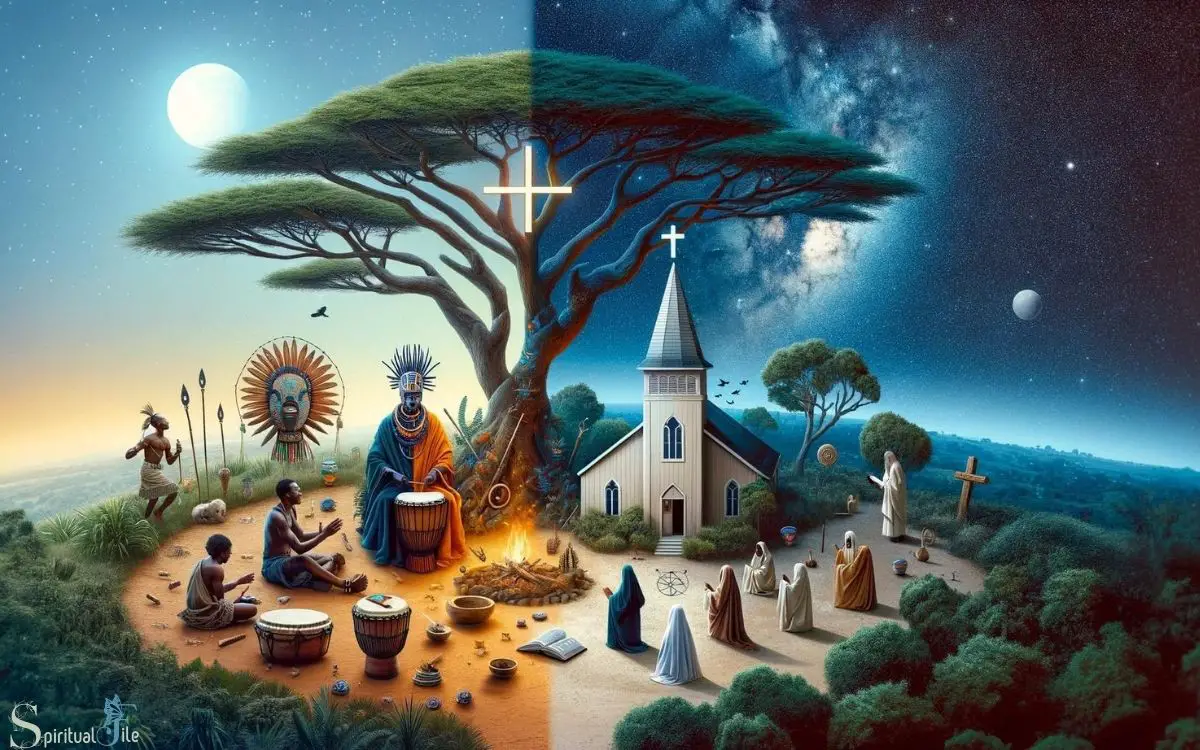
Key Takeaway
Historical Roots of African Spirituality
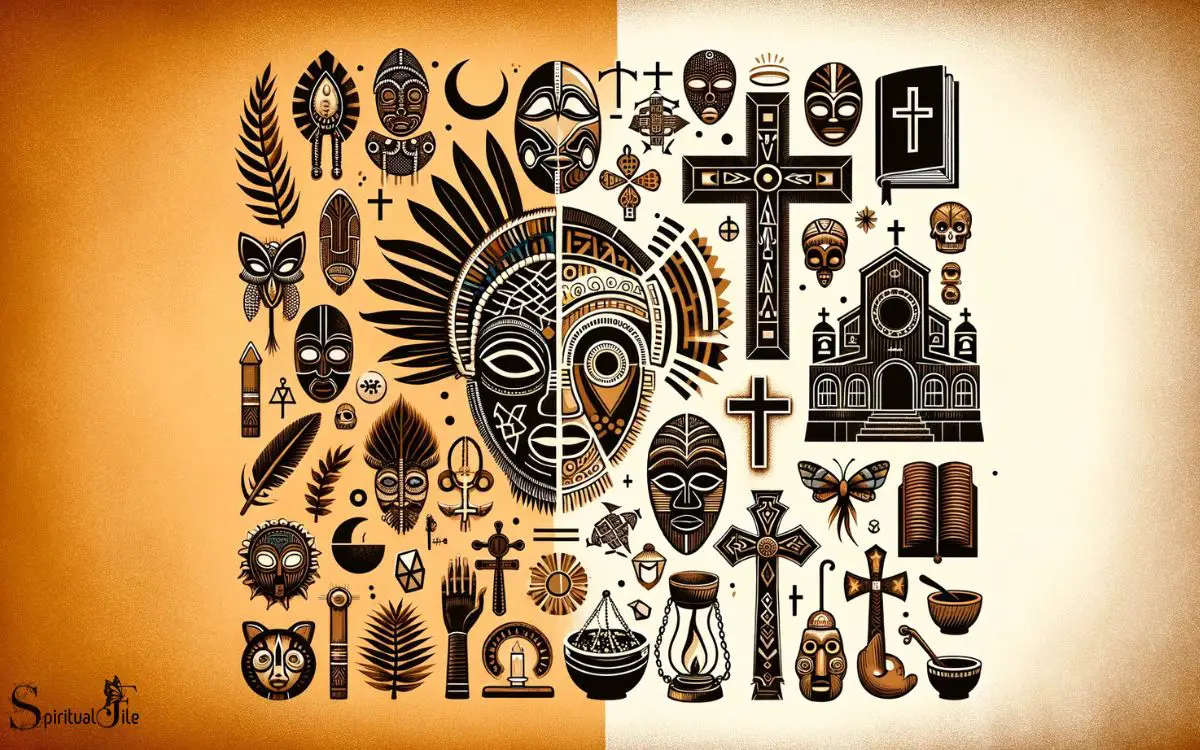
The historical roots of African spirituality can be traced back to ancient indigenous belief systems and practices that were deeply ingrained in the diverse cultures across the continent.
These belief systems were not monolithic; rather, they varied widely from region to region, encompassing a rich tapestry of traditions, rituals, and cosmologies.
What unites them, however, is a deep reverence for the natural world, ancestors, and spirits, as well as a profound interconnectedness between the physical and spiritual realms.
African spirituality also often emphasizes communal harmony, balance, and the interdependence of all living things.
While diverse in its expressions, African spirituality consistently reflects a holistic worldview that integrates the material and metaphysical, offering valuable insights into the complexities of human existence and the broader universe.
Influence of Christianity on African Belief Systems

The influence of Christianity on African belief systems has resulted in a process of syncretism, where traditional African spiritual practices have merged with Christian teachings.
This syncretic approach has impacted traditional practices, leading to a shift in religious beliefs among many African communities.
Understanding the dynamics of this influence is crucial in comprehending the complex interplay between African spirituality and Christianity.
Syncretism in Belief Systems
Influences of Christianity on African belief systems have led to a complex interweaving of spiritual practices and traditions. This syncretism has resulted in a blending of the two belief systems, shaping the religious landscape in Africa.
The impact of Christianity on African spirituality can be seen in several ways:
- Adoption of Christian symbols and rituals within traditional African ceremonies.
- Incorporation of Christian prayers and hymns into indigenous spiritual practices.
- Reinterpretation of African deities and spirits through a Christian lens.
- Integration of Christian beliefs into traditional cosmology and worldview.
This fusion of beliefs has created a unique religious identity in Africa, demonstrating the adaptability and resilience of indigenous spirituality in the face of external influences.
The syncretic nature of African belief systems reflects a dynamic interplay between Christianity and traditional practices, shaping the spiritual landscape of the continent.
Impact on Traditional Practices
The syncretic nature of African belief systems demonstrates the profound and multifaceted impact of Christianity on traditional practices, shaping the spiritual landscape of the continent.
Christianity has significantly influenced African traditional practices, leading to a complex interplay between the two belief systems.
While some traditional practices have been assimilated into Christian rituals and worship, others have been condemned as pagan and incompatible with Christian teachings.
This has caused a shift in the way traditional rituals are performed, often leading to a blending of African indigenous practices with Christian elements.
Shift in Religious Beliefs
Amidst the diverse landscape of African spirituality, Christianity has wielded a profound influence, shaping and redefining traditional beliefs and practices.
This shift in religious beliefs has resulted in a complex interplay between African spirituality and Christianity, leading to various outcomes:
- Syncretism: Many African communities have integrated Christian beliefs and practices into their traditional spirituality, creating a syncretic form of worship that combines elements of both belief systems.
- Decline of Traditional Practices: The influence of Christianity has led to a decline in some traditional African religious practices, as many individuals and communities have embraced Christian teachings and rituals.
- Preservation Efforts: Despite the impact of Christianity, some African societies have made deliberate efforts to preserve and revitalize their traditional belief systems in the face of external influences.
- Cultural Evolution: The interaction between African spirituality and Christianity has contributed to the cultural evolution of African societies, shaping their religious and social dynamics.
Rituals and Practices in African Spirituality
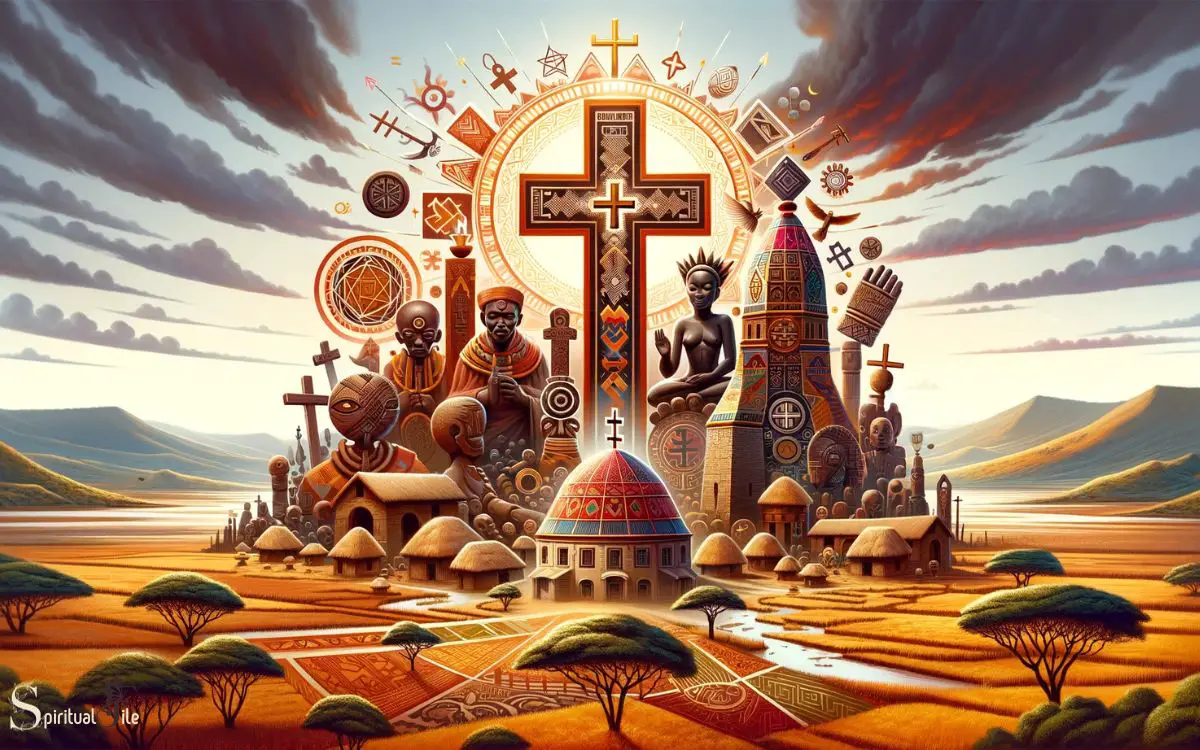
A variety of distinct ritual practices are central to African spirituality, encompassing ceremonies, offerings, and communal gatherings. These rituals are deeply rooted in the cultural and traditional beliefs of various African communities, often involving dance, music, and symbolic gestures.
Ancestral veneration is a common theme in these rituals, emphasizing the interconnectedness between the living and the deceased. Additionally, the use of natural elements such as water, fire, and herbs plays a significant role in purification and healing ceremonies.
Unlike Christianity, African spirituality places a strong emphasis on collective participation, where the entire community is involved in these rituals, fostering a sense of unity and shared responsibility.
These practices are integral to the spiritual and social fabric of African societies, serving as a means of honoring the past, seeking guidance, and maintaining harmony with the natural world.
The Concept of God in African Spirituality and Christianity
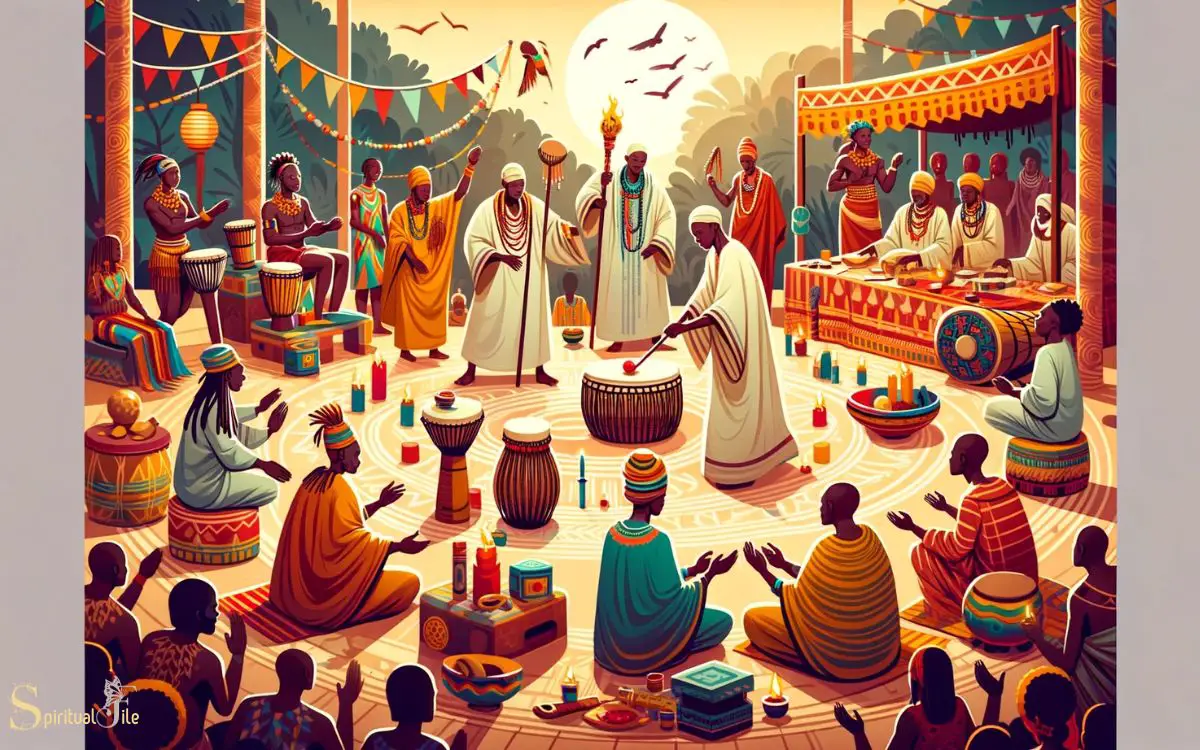
Rooted in the cultural and traditional beliefs of various African communities, African spirituality perceives the concept of God as interconnected with nature, ancestors, and the community, embodying a holistic and communal understanding of divinity.
African Spirituality:
- Views God as interconnected with nature, ancestors, and the community.
- Embraces a holistic and communal understanding of divinity.
- Recognizes the presence of multiple deities or spiritual forces.
- Acknowledges the importance of rituals and ceremonies in honoring and connecting with the divine.
Christianity:
- Conceptualizes God as a singular, omnipotent being separate from nature.
- Emphasizes a personal and individual relationship with God.
- Believes in the Holy Trinity – Father, Son, and Holy Spirit.
- Places importance on prayer, worship, and sacraments as means of connecting with God.
Colonialism and Its Impact on Indigenous African Beliefs
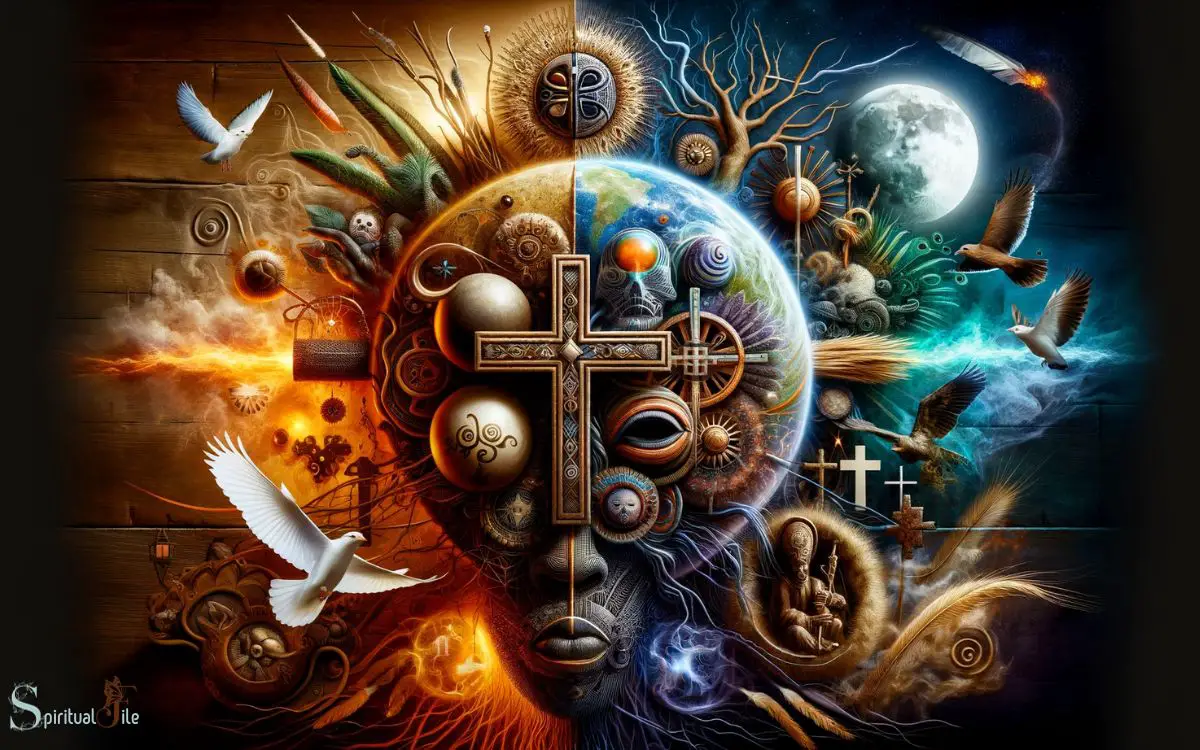
The impact of colonialism on indigenous African beliefs is evident in the significant reshaping and often suppression of traditional spiritual practices and cultural expressions.
With the arrival of colonial powers, there was a deliberate effort to impose Western religious beliefs and practices, leading to the marginalization and stigmatization of indigenous African spirituality.
This resulted in a loss of knowledge and understanding of traditional belief systems, as well as the erosion of cultural practices that were deeply intertwined with spirituality.
The imposition of Christianity as the dominant religion further alienated indigenous African beliefs, contributing to a sense of inferiority and the devaluation of traditional spiritual practices.
The enduring impacts of colonialism continue to shape the dynamics between African spirituality and Christianity in contemporary society.
Syncretism and Hybridity in African Religious Practices
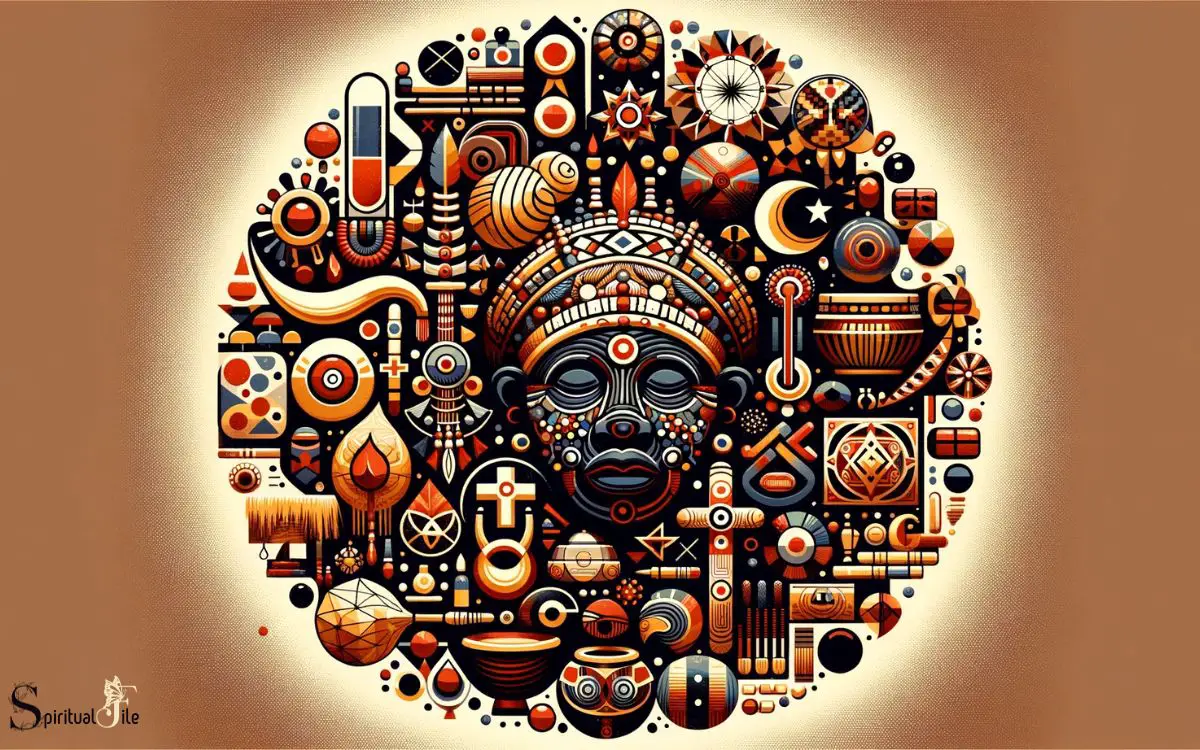
The syncretism and hybridity in African religious practices reflect the complex and dynamic nature of spirituality in the region.
Dual religious practices and cultural blending in religion have resulted in a rich tapestry of beliefs that incorporate elements from indigenous African traditions and Christianity.
This interplay between different belief systems highlights the adaptability and resilience of African spirituality in the face of external influences.
Dual Religious Practices
African religious practices exhibit a complex interplay of syncretism and hybridity, reflecting the dynamic fusion of indigenous spiritual beliefs and external religious influences.
This interplay has resulted in the emergence of dual religious practices, where individuals simultaneously engage in both traditional African spirituality and Christianity.
This phenomenon showcases the adaptability and inclusivity of African religious belief systems, as individuals navigate and integrate diverse spiritual influences into their lives.
The dual religious practices in Africa can be understood through the following points:
- Coexistence: Both traditional African spiritual practices and Christianity coexist within the lives of individuals, allowing for a blending of rituals, beliefs, and ceremonies.
- Symbiotic Relationships: The interaction between traditional African spirituality and Christianity often leads to symbiotic relationships, where elements from both belief systems inform and enrich one another.
- Personal Identity: Dual religious practices contribute to the formation of individuals’ personal and cultural identities, reflecting their multifaceted spiritual experiences.
- Social Dynamics: The presence of dual religious practices influences social dynamics within communities, shaping patterns of worship, community gatherings, and cultural traditions.
Cultural Blending in Religion
In the realm of African spirituality and Christianity, cultural blending occurs through the process of syncretism and hybridity, shaping the religious practices of individuals and communities.
Syncretism refers to the merging of different belief systems, resulting in a new, blended form of spirituality. In the context of African religious practices, this often involves the incorporation of traditional indigenous beliefs with Christian doctrines and rituals.
On the other hand, hybridity reflects a more complex interplay, where distinct religious elements coexist without fully merging.
This dynamic interaction between African spirituality and Christianity showcases the adaptability and resilience of belief systems in response to historical and sociocultural influences.
It also highlights the diverse ways in which individuals and communities navigate their religious identities, creating unique expressions of faith that embody both tradition and change.
How Do African Spiritual Traditions Differ from Native American Spiritual Practices in Comparison to Christianity?
African spiritual traditions and Native American spiritual practices both share an emphasis on a deep connection with nature and the belief in ancestral spirits. However, their rituals, ceremonies, and beliefs differ significantly, especially in comparison to Christianity. Native American spirituality comparison reveals unique cultural and historical influences on their respective traditions.
Contemporary Expressions of African Spirituality and Christianity
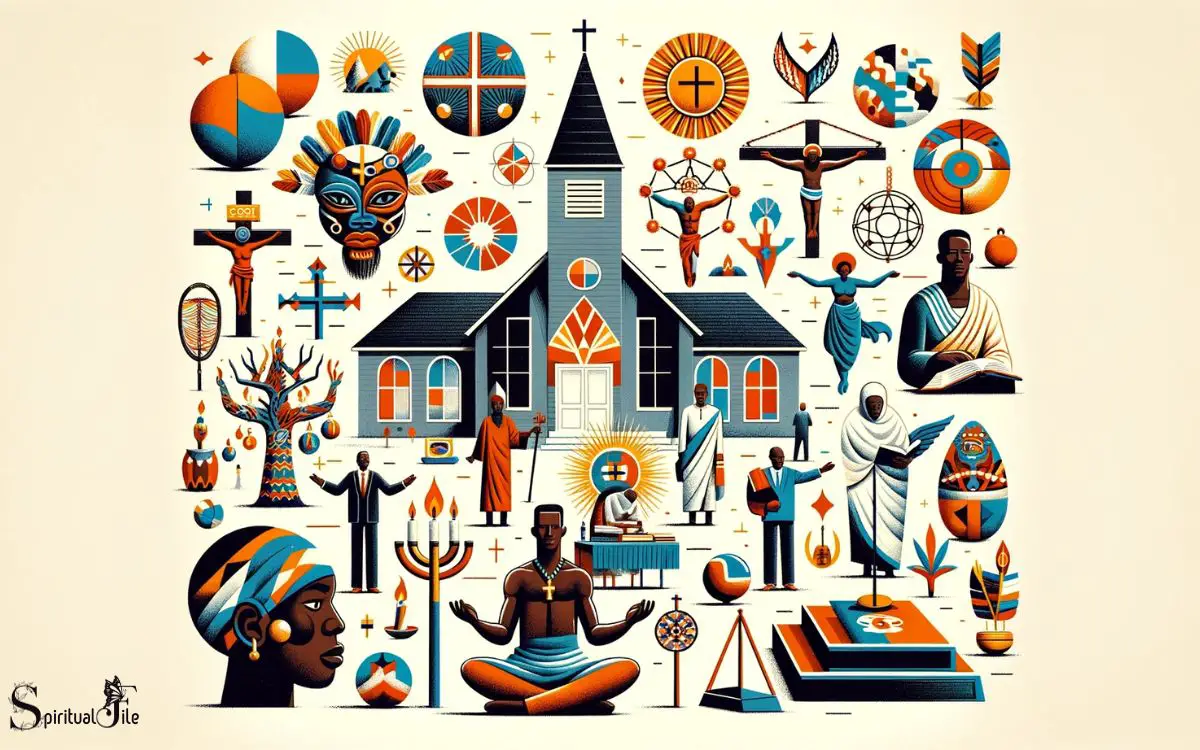
Contemporary expressions of spirituality and Christianity in Africa reveal a complex interplay between traditional beliefs and religious practices.
This interplay is evident in various ways:
- Syncretism: Many African Christians incorporate indigenous beliefs and practices into their faith, creating a unique blend of Christianity and traditional spirituality.
- Pentecostalism: The rise of Pentecostal churches in Africa has brought a dynamic form of Christianity that emphasizes spiritual experiences and healing, resonating with traditional African spirituality.
- Indigenous Knowledge Systems: Some African Christians actively engage with indigenous knowledge systems, incorporating traditional healing practices and spiritual beliefs into their Christian faith.
- Interfaith Dialogue: In contemporary Africa, there is a growing trend of dialogue and collaboration between practitioners of African spirituality and Christianity, aiming to find common ground and mutual understanding.
Conclusion
The intertwining of African spirituality and Christianity has created a complex and dynamic religious landscape.
The historical roots, rituals, and concepts of God in both belief systems have shaped the spiritual experiences of African communities.
The impact of colonialism and the ongoing process of syncretism have further influenced the expression of these beliefs.
The contemporary manifestations of African spirituality and Christianity continue to reflect the resilience and adaptability of indigenous religious practices in Africa.






